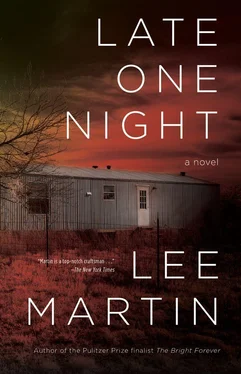“Taillight’s out.” Biggs had his hands on the door frame, leaning in through the open window. “Where you been, Ronnie?”
“Brick Chapel. Seeing after that job you cost me.”
“Now how did I do that?”
“All that nonsense this afternoon.”
Biggs leaned in closer. “Get that taillight seen to,” he said, and Ronnie told him he would.
He pulled the Firebird back onto the highway and followed it, just under the speed limit, on into Phillipsport and then the eight miles to Goldengate where Brandi’s house was full of light. To Ronnie, at the end of this winter day when so much had gone wrong, it was tempting to believe that something festive was waiting for him inside those brightly lit rooms.
The first thing he noticed when he came through the front door was that Brandi had on her coat, and that gave him a strange feeling. To see her standing there with her coat on as if any second she might walk out the door, which, stunned as he was, he didn’t bother to close. He’d taken the old storm door down a while back, meaning to replace it with a new one, but he hadn’t gotten around to it yet, so there was nothing to block the cold air rushing into the house.
“Brandi?” he said.
She had her arms crossed, resting on her stomach. The girls were nowhere to be seen, and to Ronnie’s dismay there was no sign of them living in that house. No toys or dolls scattered on the floor as usual. None of their snow boots or gloves or coats tossed willy-nilly. Someone had picked up everything and put it away. The house was quiet. No television. No video games. No music. No squealing laughter. Just Ronnie and Brandi facing each other across the tidy living room. Just the two of them, the way it’d been before the fire.
Then, with a suddenness that startled him, she said, “Did you burn up that trailer? Is that why you went out driving that night?”
Ronnie felt all the air leave him. Here he was in that place he’d never wanted to be, that place where he had to start answering questions, and he knew it was because Angel had found his pocketknife and had apparently started to tell the story.
“Oh,” he said. That was all. Like he’d been punched in the stomach and couldn’t get his breath. “Oh,” he said again. “I wish Angel hadn’t told you about that.”
He’d never seen a look on Brandi’s face like the one that came to it now, not even on the night Pat Wade came to tell them about the fire. It was like something gave way inside her, and he could see the fear in her quivering chin, and the disbelief in her slack jaw and the distress in her watery eyes. It hit him with a force that almost brought him to his knees, because for a moment he had the eerie sensation that he was looking at Della’s face, the way it surely was countless times after he left her heartbroken and fearful of what the future might hold, or, worse yet, the way she looked the night of the fire at the moment she lost hope and knew she wasn’t going to get everyone out of the trailer.
Such a thought froze him, and even though he knew he should say something more, should explain it all — he could only stand there, dumb and looking guilty as sin.
Brandi was shaking her head. She was pointing to the door. “Get out.”
“But, baby—”
“I mean it. Now.”
“But my girls.” He looked around the room again, eager for some sign of them, something that would tell him all of this was a bad dream and any second he’d wake from it and find his family welcoming him home. “What’s happened to my girls?”
Brandi was on him now, her hands balled into fists, beating against his face, his arms, his chest. He could smell her perfume, Love’s Musky Jasmine — he’d given it to her for Christmas. She wouldn’t stop hitting him, and, finally, stumbling backward to the front door, he thought to take out his pocketknife. If he could show her that knife, maybe he could start to explain.
He wasn’t aware that he’d opened the blade. Just a matter of habit, but Brandi had no way of knowing what he intended. She was screaming now. She made one more rush at him and he let her come. She shoved him backward through the open door and he stumbled over the threshold strip and fell. Just before the door closed, he saw Angel in the hallway, her arms folded over her chest. He called out to her. He got to his feet and pounded on the door. He pounded and pounded. “Brandi,” he said. “Brandi, let me in.” But there was no answer, and then, one by one, the lights went off inside the house.
While all of this was happening, Shooter and Captain were going over their story of what had taken place the night of the fire. They’d had an argument over Della and her goats, and Captain had gone off to his bedroom in a snit. Shooter turned on a John Wayne movie and fell asleep. When he woke, the movie was over, and the house was very still. He got up and went to check the front door lock. He looked out the window and saw Ronnie’s Firebird. He stood there long enough to see Ronnie come out from behind the trailer, get into his car, and drive toward town. This much he’d told Pat and Missy — he’d even told them that Ronnie was toting something — but Shooter hadn’t told them everything.
He hadn’t told them how he’d gone down the hallway to Captain’s bedroom that night.
The door was open, but Captain was nowhere to be seen. Shooter could see that his bed was still made. He went into the kitchen and grabbed his coat off the peg hook by the door. Then he opened the door and stepped out into the cold night.
“What did you do first?” Shooter asked Captain now. “I mean, when you first went outside that night.”
Captain was sitting at the kitchen table looking at a Hot Rod magazine. He turned the pages slowly, studying the pictures of cars: a 1933 Ford Coupe, a 1955 Buick Roadmaster, a 1966 Ford Mustang, a 1981 Chevrolet Malibu. He had on plaid flannel pajamas — green and black — and his hair smelled fresh from his shower. It was getting too long, the blond bangs hanging down over his eyes, and Shooter, who was pacing back and forth alongside the table, knew he’d have to remember to take him into Goldengate soon for a haircut.
“What night?” Captain wanted to know.
“The night of the fire. Now listen to me. What did you do first?”
“I went to see the goats.” Captain turned another page. “Della’s goats. They got out that afternoon.”
“That’s right. They got out, and we herded them back in and we patched the fence, right?”
“And you were mad.”
Shooter stopped pacing. He said, “I wasn’t mad. What was I mad about?”
“The goats,” Captain said. “Della. You were mad.”
Shooter reached over and closed the magazine. Outside, the wind had come up, and the arborvitae shrubs at the corner of the house were scraping the siding and making a noise that put him on edge.
“What did you do after you saw the goats were all right?”
“I don’t remember.”
Captain was looking down at the cover of the magazine. Hot Rod Drag Week—2010 , the cover said across a picture of a white Chevelle, smoke coming off its rear tires. Shooter reached down and cupped Captain’s chin. He lifted his face, made him look him in the eyes.
“The sheriff might ask you questions.” They’d heard the news about the fire marshal’s report on WPLP at supper, and ever since, Shooter had been thinking about everything that might happen. He was thinking that it might be time for him to have a talk with Biggs. “You’re going to have to know what you’re going to tell him,” he said to Captain.
Shooter had meant to tell the fire marshal’s deputy when he’d been by earlier to question him that he’d seen Ronnie come from behind the trailer the night of the fire. Then Shooter started thinking about Biggs asking questions, as he surely would, and how sooner or later he’d want to talk to Captain, and Shooter had put off going to the authorities a day at a time because he couldn’t bear the thought of Captain being in the spotlight. Hadn’t there been enough wrongheaded stories and out-and-out lies about him? Sure, Shooter had heard them, rumors boys spread about Captain having done this and that. Malicious gossip about deviant sexual practices, devil worship, anything the boys could make up to give themselves a thrill. Any right-thinking person would know those stories to be lies as soon as they heard them, but there were the idiotic and the cruel who wanted them to be true so they could feel justified in what they’d always thought but perhaps had been hesitant to say: that Wesley Rowe — that Captain — needed to be put somewhere for those of his kind, somewhere he couldn’t hurt anyone. Shooter had sworn he’d protect him, but now that the fire marshal had ruled the fire suspicious, he knew he couldn’t wait much longer. He’d have to start talking, and so would Captain. Shooter didn’t want him to appear to be dumb when he made his answers. It was important that he offer up the facts with honesty and clarity so no one would be able to doubt him.
Читать дальше












